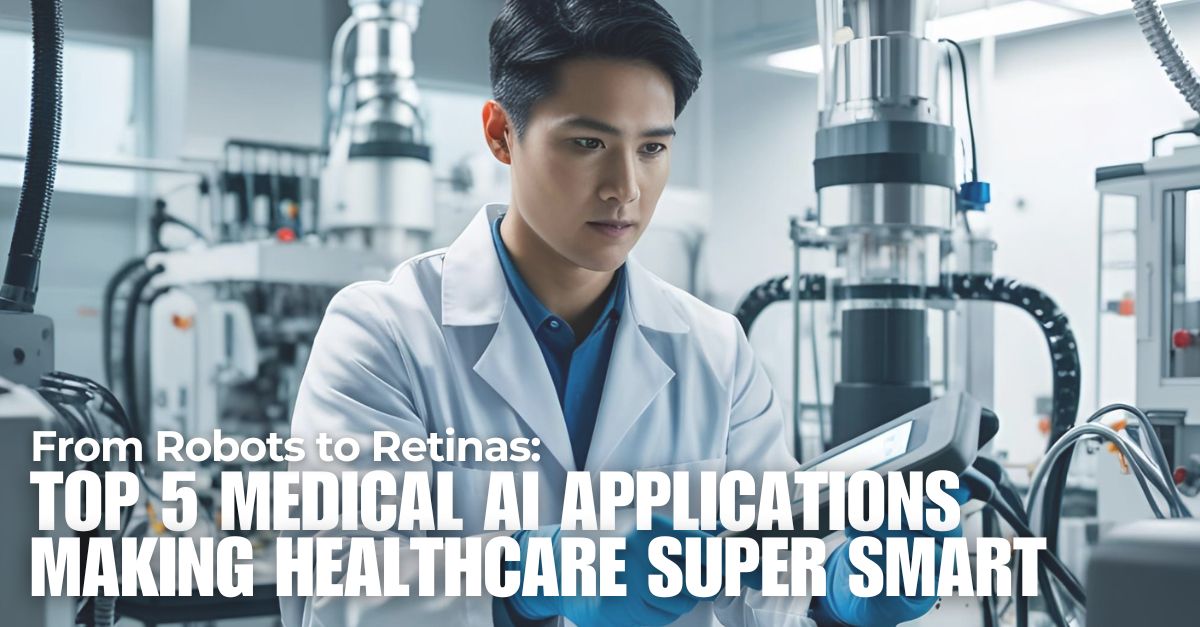AI & Robotics
From Robots to Retinas: Top 5 Medical AI Applications Making Healthcare Super Smart

In January 2025, the World Economic Forum, in collaboration with Boston Consulting Group, released the report "The Future of AI-Enabled Health: Leading the Way", which positions AI as a transformative force in healthcare. The report highlights how AI is rapidly reshaping medical practices and patient care globally, including in regions like Hong Kong, where the push for AI integration aims to enhance service quality and operational efficiency.
This blog post delves into 5 of the most attractive AI applications in healthcare as of 2025, showcasing how Hong Kong's healthcare sector is particularly poised to embrace these AI advancements.
1. AI Diagnostics: The Future of Early Detection
AI algorithms are changing diagnostics by analysing large volumes of patient data, including medical records and imaging scans. These advanced systems detect patterns and anomalies that might be challenging for human clinicians to spot. For example, Google Health's AI model demonstrated the ability to identify breast cancer in mammograms with greater accuracy than radiologists. In Hong Kong, healthcare providers are beginning to adopt similar technologies to improve the early detection of critical illnesses like cancer and cardiovascular diseases.
2. AI Genetic Risk Prediction: Personalised Medicine Takes Center Stage
AI plays a crucial role in predicting genetic risks for common diseases. Bupa’s "Health Insights" is a prime example, of using machine learning to assess polygenic risk scores for conditions such as cardiovascular diseases, diabetes, and specific cancers. In a real-world scenario, a patient identified with a high genetic risk for type 2 diabetes could receive personalised lifestyle recommendations, reducing their risk of disease onset. This approach is gaining traction in Hong Kong as medical institutions explore more personalised and preventative healthcare strategies.
3. Retinal Imaging AI for Systemic Health Monitoring
Retinal imaging AI offers a non-invasive method to monitor systemic health conditions. It is widely used to detect diabetic retinopathy but also shows promise in assessing cardiovascular, neurological, and metabolic health. A notable example is Eyenuk's EyeArt system, which received FDA clearance for autonomous diabetic retinopathy screening. Hospitals in Hong Kong are considering such technology to broaden the scope of regular health screenings and provide a holistic view of patients' health through simple eye scans.
4. AI in Drug Discovery: Accelerating the Path to New Treatments
The pharmaceutical industry is leveraging AI to streamline the drug discovery process. AI models predict molecular interactions, identify promising drug candidates, and optimise clinical trials. For example, Insilico Medicine, a company with a presence in Hong Kong, used AI to identify a novel drug candidate for idiopathic pulmonary fibrosis in less than 18 months —a process that traditionally takes years. According to a Boston Consulting Group report, AI-generated drug molecules show an 80-90% success rate in Phase I clinical trials, significantly higher than the historical average of 50%.
5. AI Agents in Healthcare Administration: Enhancing Efficiency
AI agents are becoming super helpful in healthcare administration, managing tasks like clinical registration, patient enquiries follow-ups, and streamlining medical histories for clinicians. Grove AI's "Grace" virtual agent is a prominent example. These AI technologies help reduce physician burnout and optimise hospital workflows, which is valuable in Hong Kong, where healthcare providers face resource constraints and increasing demand for services. However, it is crucial to implement robust safeguards to maintain trust among healthcare professionals and patients.
HKT Enabling Hong Kong's AI Healthcare Transformation
The integration of AI in healthcare or medical care is not just a global trend but a vital opportunity for Hong Kong's healthcare sector. HKT Enterprise Solutions offers advanced 5G, IoT, and AI digital solutions to support local hospitals and healthcare providers in adopting these AI technologies. By leveraging these technologies, Hong Kong's healthcare system can enhance service quality, improve patient outcomes, and maintain its competitive edge in the era of medical AI.